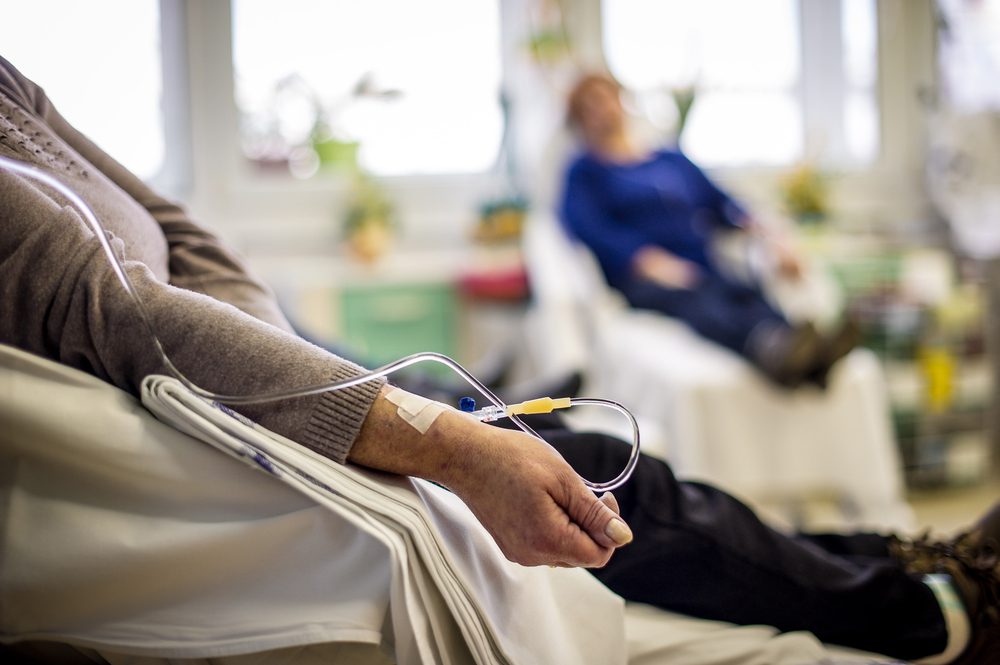September is recognized as Blood Cancer Awareness Month, a time of year to help spread awareness about blood malignancies among the general public and the medical community. In order to help spread the word about this vital awareness event, we sat down with Lisa Machado, who lives with chronic myeloid leukemia (CML).
Lisa’s Story
Lisa was 36 with two young children when she got health news that would change her entire life.
“I noticed there was this weird bruise on my arm. I had it looked at by a doctor, and about twelve hours later, I was in the emergency room.” – Lisa
Within a few hours, she was diagnosed with chronic myeloid leukemia. Today, Lisa helps run a nonprofit called the Canadian CML Network, and she often gets questions from concerned parents who have been diagnosed.
“When there are people that are depending on you and you get a life-threatening diagnosis, everything changes. It ups the ante a little bit. All I could focus on was how I was going to take care of my kids. What if I died? Then they would be left without a mom and this tragedy in their lives that they would have to deal with.”
This fear about the future was one of the toughest aspects of getting diagnosed for Lisa. Though she is typically a positive-spirited person, she struggled with negative thoughts and anxiety. Living with uncertainty was difficult. Fortunately, there were therapies available that made the chance of long-term survival good and allowed her to live an active life with a strong career and passions that she enjoys.
One of these passions is fitness and exercise, specifically CrossFit, a high intensity physical fitness regimen. Lisa says that exercise not only benefits her physical health, but also her emotional health.
“I’ve always been active. A year ago, I joined a CrossFit class, which at first was terrifying because there are barbells and weights – heavy things that scared the heck out of me. I didn’t really know what I was doing, but five classes in and I felt like a badass. Plus, I could see that I was getting stronger.”
The challenge of CrossFit tests Lisa’s physical strength and mental strength. She compared the tough exercises to some of her most difficult experiences as a blood cancer patient, such as painful bone marrow biopsies.
Lisa touched more on mental health, noting that while outcomes and survival are generally good for chronic myeloid leukemia, there is always the worry that things may take a turn for the worse. One of the ways she manages this sense of uncertainty, she says, is by connecting with other patients — people who understand what it feels like to worry about what comes next.
Lisa was a finance journalist before she was diagnosed with CML, but shortly afterwards, she shifted her focus to health. Today, she is a journalist with Advocacy and Better Health, a content development agency that supports advocacy groups with communications strategy.
As the founder of the Canadian CML Network, building a community for patients was Lisa’s first priority. Other focuses include emotional support and disease education.
“There’s a perception that because CML is well-treated and managed for many patients that there aren’t any issues…but levels of anxiety and depression are very high in our community.”
If she had just one piece of advice to share with other people living with a health challenge, Lisa says that finding community is one of the most important things you can do for yourself to help you move forward. And if you can’t find one, then try starting one.
Learn more about the Canadian CML Network here.

About Lisa:
Lisa Machado is a leading Canadian advocate for patients and caregivers. She has been invited to speak and moderate at numerous events in Canada and around the world about what it’s like to live with a chronic cancer, the gaps in health care policy, barriers to patient care, such as drug access, and the importance of supporting caregivers. Her experiences as a patient, as well as a caregiver and advocate for her father (lost to dementia in 2019) and her brother (lost to complications from liver cancer in 2021), have given her unique and thought-provoking insights into what it means to be a consumer of health care in Canada, why caregivers are essential to any health care team, and the challenges facing patients as they seek the best health outcomes.
About Chronic Myeloid Leukemia
Chronic myeloid leukemia, which is sometimes also referred to as chronic myelogenous leukemia, is a form of blood cancer that affects a class of white blood cells called granulocytes. It is distinguished from other similar cancers by a distinctive chromosomal translocation, dubbed the “Philadelphia chromosome.” In the vast majority of cases, no precise cause of chronic myeloid leukemia can be identified. Risk factors for the disease include being male, exposure to ionizing radiation, and old age. The disease has three distinct phases: the chronic phase, the accelerated phase, and the “blast crisis.” The chronic phase often presents with no symptoms, but when they are present, they include loss of weight and appetite, enlarged spleen and liver, night sweats, and fever. Ecchymosis, petechiae, infections, bleeding, bone pain, and bone marrow fibrosis occur in more advanced phases. Common treatment includes bone marrow transplant and tyrosine kinase inhibitors; five-year survival rate is favorable at 89 percent. To learn more about chronic myeloid leukemia, click here.








